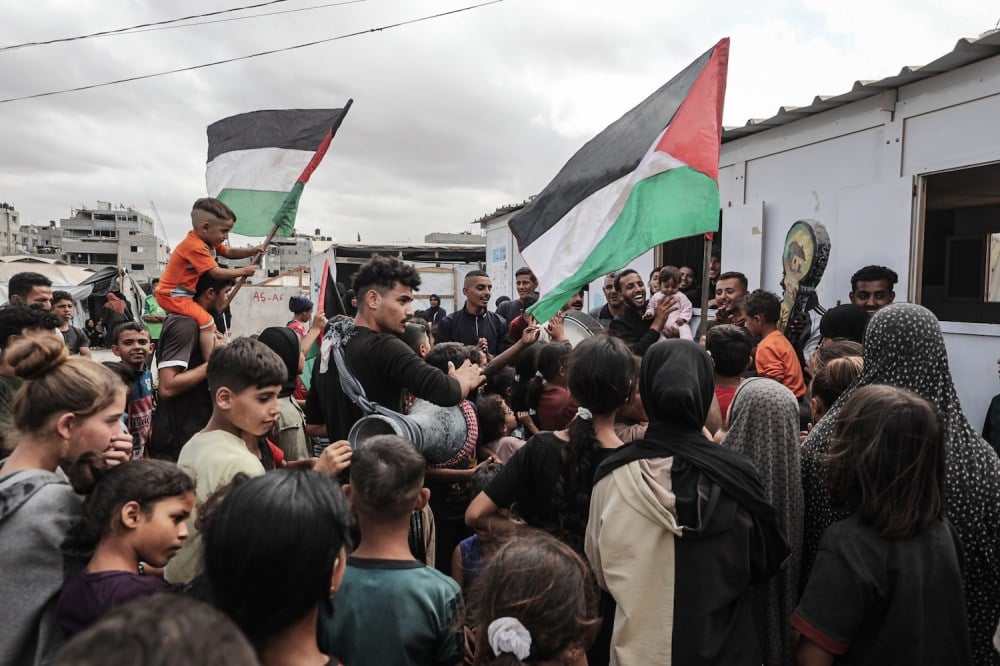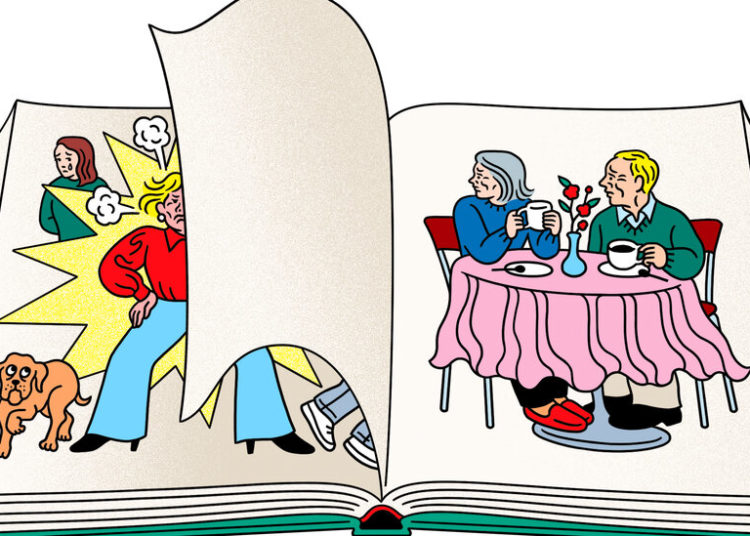Welcome back to World Brief, where we’re looking at the deal between Israel and Hamas in Gaza, a Taliban official’s trip to India, and the Hungarian author who won the Nobel Prize in literature.
Steps Toward Peace
On Wednesday, Israel and Hamas agreed to pause fighting in Gaza to facilitate a hostage and prisoner swap—the first phase in the Gaza peace plan proposed by U.S. President Donald Trump. If it holds, the agreement will be a major breakthrough in ending the war, which has claimed more than 65,000 Palestinian lives since Hamas killed roughly 1,200 people and captured 251 hostages in an attack on Israel on Oct. 7, 2023.
As the deal stands, Hamas said it will release all remaining hostages, including the roughly 20 who are believed to be alive and the bodies of around 25 others. Israel, meanwhile, will release 1,700 Gazans detained during the war and an additional 250 Palestinians serving life sentences in Israel. Israel will also partially withdraw from Gaza and allow a surge of medical aid and food trucks into the enclave.
This is the third cease-fire reached in the war; most recently, 25 Israeli hostages were exchanged for almost 2,000 prisoners earlier this year before Israel ended the cease-fire in a surprise attack in March.
At a cabinet meeting on Thursday, Trump announced his plans to travel to Egypt for an “official signing” of the deal in the near future. And in a phone call with Trump on Thursday, Israeli Prime Minister Benjamin Netanyahu invited the U.S. president to address the Knesset during the latter’s expected visit to Israel on Sunday.
But the intricacies of the deal—and just how much of Trump’s plan has been accepted—are unclear. Both sides are on track to concede their most aspirational demands: Hamas has long refused to release hostages unless arrangements for a permanent cease-fire are made, while Israel has repeatedly refused deals that don’t involve Hamas’s disarmament. Other sticking points, such as the Palestinian Authority’s role in postwar Gaza and the potential for a two-state solution, were only vaguely detailed in Trump’s plan and have not yet been agreed upon by the parties.
“The current deal is a major accomplishment and an important step forward for both Gaza and Israel—making it last will prove even harder,” Daniel Byman wrote in Foreign Policy. The international pressure from Europe, the United States, and the Arab world that forced negotiations will likely continue. But Israel and Hamas might themselves compromise a lasting cease-fire by refusing to adhere to conditions of the deal, dragging their feet, or resuming fighting outright.
Israel’s government is expected to convene on Thursday to vote on the deal. If it is approved, the cease-fire will go into effect immediately. The hostage and prisoner exchange will take place soon after—likely Monday or Tuesday, according to Trump.
Though the agreement is tentative, hundreds gathered in Tel Aviv’s “hostages square” to celebrate the announcement. In Gaza, celebrations spilled into the streets amid flattened buildings, rubble, and the memory of tens of thousands killed.
“We don’t know whether to feel happy or sad,” one woman displaced from Khan Younis, a city in the southern Gaza Strip, told The Associated Press. “A whole generation was lost. Two generations were lost, not just one. May God make it up for us.”
Today’s Most Read
- Trump’s Speech to Generals Was Incitement to Violence Against Americans by Kori Schake
- The Future of Intelligence Is Open by Greg Levesque and Calder Walton
- Is Europe’s Top Diplomat Diplomatic Enough? by Anchal Vohra
What We’re Following
Two trips to India. On Thursday, India hosted two major visitors: British Prime Minister Keir Starmer and Taliban Foreign Minister Amir Khan Muttaqi.
At a meeting in Mumbai, Starmer and Indian Prime Minister Narendra Modi inked a $468 million contract to supply the Indian Army with U.K.-manufactured air defense missiles, which are built in a factory in Northern Ireland that also makes weapons for Ukraine. “The deal paves the way for a broader complex weapons partnership between the UK and India,” the U.K. government said in a statement. Starmer and Modi also made strides toward another major deal to collaborate on the development of electric-powered engines for Indian naval ships.
Meanwhile, Muttaqi is making the most of a temporary reprieve of his U.N. travel ban with a six-day tour of India, including a meeting with his Indian counterpart, Foreign Minister S. Jaishankar, and a visit to the Taj Mahal. The trip comes at a critical moment as India’s perennial rival, Pakistan, battles a Taliban insurgency, and it marks the first time that a Taliban leader has visited India since the group took control of Afghanistan in 2021.
Muttaqi’s tour of India follows a trip to Russia, the only country to recognize the Taliban government, earlier this week. Both Russia and India recently sided with the Taliban against Trump’s call for the United States to retake Bagram Airfield in Afghanistan.
South Sudan reshuffle. Late Wednesday, South Sudanese President Salva Kiir removed Gen. Dau Aturjong from his position as defense chief and reinstated Aturjong’s predecessor, Paul Ngang Majok, whom Kiir fired just three months ago.
No official reason was provided for either of these decisions, but they are part of a string of reshuffling within South Sudan’s military and government. In September, Kiir’s government charged former rebel leader Riek Machar with murder, treason, and crimes against humanity for his alleged involvement in an attack that killed 28 people in March. Machar was also stripped of the vice presidency, which he assumed in 2020 as part of a post-civil war power-sharing agreement.
Analysts say these shake-ups may be a bid by Kiir to consolidate control ahead of long-postponed elections, now expected to be held in 2026. Kiir has led the transitional government since South Sudan gained independence from Sudan in 2011 and throughout the country’s nearly five-year civil war.
Apostolic exhortation. Pope Leo released his first major papal document, titled “I Have Loved You,” on Thursday, calling on Christians to love and prioritize the poor and the suffering. Known as an apostolic exhortation, the document was started by the late Pope Francis and finished by Leo, who assumed the papacy in May.
The exhortation praises the church’s tradition of welcoming strangers and especially credits women for their work providing health care to the poor. Leo, whose criticism of the Trump administration has been ramping up, also seemed to reference Trump’s immigration policies: “Where the world sees threats, she [the Catholic Church] sees children; where walls are built, she builds bridges.”
Leo criticized “political-economic systems that favor the strongest” for creating extreme wealth inequality and a culture that “tolerates with indifference that millions of people die of hunger or survive in conditions unfit for human beings.” He called for a global commitment to addressing the root causes of poverty while giving charity to those who suffer in the meantime. “A Church that sets no limits to love, that knows no enemies to fight but only men and women to love, is the Church that the world needs today,” Leo wrote.
Odds and Ends
The Nobel Prize in literature was awarded to Hungarian novelist Laszlo Krasznahorkai “for his compelling and visionary oeuvre that, in the midst of apocalyptic terror, reaffirms the power of art,” as seen in works such as his 1999 novel War and War, about an archivist who loses his mind and travels from provincial Hungary to New York City, and his short story “An Angel Passed Above Us,” which takes place in the mud of a trench and contrasts the dazzling wonders and abject horrors of the modern world—and please excuse the run-on sentence: This World Brief writer is only paying homage to Krasznahorkai’s signature style.
The post A Momentous Deal for Israel and Gaza appeared first on Foreign Policy.




